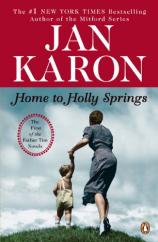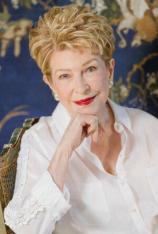Interview: December 14, 2007
December 14, 2007
After launching her first novel AT HOME IN MITFORD more than a decade ago, author Jan Karon’s Mitford series numbers a whopping 30 million copies in print. Her stories about an Episcopal priest are lauded for their charming characters, the evocation of small town life and her gentle inclusion of faith. In HOME TO HOLLY SPRINGS, the first installment in her Father Tim Novels, Karon takes her beloved priest to new locations and levels of self-understanding. Bookreporter.com’s Cindy Crosby talks with Karon about the book and Father Tim Kavanagh’s future escapades, the challenges of getting older, the importance of Advent and her new appreciation of Elvis.
Bookreporter.com: You have begun a new series, the Father Tim Novels, with HOME TO HOLLY SPRINGS as the first installment. However, Father Tim Kavanagh is still the axis upon which the story revolves, just as he was in the Mitford series. How is the new series different? How is it the same?
Jan Karon: The new series embodies, I feel, the spirit of the old. That is to say, redemption continues to be the overarching theme in this, and all, my work. It’s different in that we’re given a far deeper look into the soul of a man we’ve come to know well --- but until now, not as completely.
BRC: What were some of the challenges of moving your fictional setting to Mississippi from North Carolina? How did you do your research?
JK: I went to Holly Springs and spent roughly a week driving through the countryside, visiting the shops and stores around the square, visiting historic homes that Father Tim would have visited as a young boy and, later, a young seminarian. The challenge was to write authentically about a real town --- that is, to get the street names right, the names of the houses properly attributed, the headstones in the cemetery notated (at least two markers and their inscriptions appear in the novel), get their insects, trees, bushes, animals (yes, they have groundhogs), flowers and seasonal quirks right.
I’d call Booker’s hardware store and say, “Hey, what’s the temperature down there today? Any rain?” For a few days I was writing within the same time framework in which the story was set. I wanted the setting to feel natural and right to the people of Holly Springs. It would have been an insult to them, and to me, if I were to make shoddy work of the facts.
BRC: THE MITFORD COOKBOOK AND KITCHEN READER based on the Mitford series was a big hit at my house. Should we look for “squirrel dumplings” or “roasted woodchuck” recipes prepared by the characters in HOLLY SPRINGS anytime soon? Come to think of it, are there such dishes and have you tasted them?
JK: The dishes mentioned in the book are --- here’s that word, again --- authentic to a part of the southern culture. No more cookbooks for me, though. And I would taste groundhog, of course — but only with a gun to my head.
BRC: It’s difficult to believe Father Tim is 70 (or “68 plus some change”)! Although you don’t look a day older than you did when you began the Mitford series, what do you like about getting older, and what is most difficult?
JK: I tried to answer this question with seemly wisdom and demonstrate how delighted I am to be growing older. But I have deleted everything I said, because I didn’t mean it. Growing older is hard. I am 17 in my heart and that’s all I can reasonably tell you. Oh. Sorry. I forgot to say that I really do like having Medicare and a Social Security check, though this hardly compensates for wrinkles and age spots.
BRC: In HOLLY SPRINGS, Jessica tells Father Tim: “I think th’ whole point of life is to know God, and be able to accept the way things turn out.” Does this reflect your own philosophy of life?
JK: Pretty much.
BRC: HOLLY SPRINGS seems to enlarge and change the way we view “family” and “home.”
JK: Home, somebody said, is where the heart is. Father Tim has a good heart, which is not so rare and unusual in this world as cynics may think. So, whether Holly Springs or Mitford, he will find home. I connect easily with people, and thus I, also, find it easy to feel at home almost anywhere.
BRC: Your detailed plot twist involving leukemia was fascinating. Do you have any personal experience with this particular medical issue? Or is it just something you thought would help make the plot interesting?
JK: Plots, like characters, come to me. There’s a sense in which the story tells itself to me, and I have to do the dirty work, the legwork, to make it all make sense. Actually, I love the research part. I have no actual experience with leukemia, but I talked with many experts in the field and then asked them to read what I had written.
BRC: Themes of forgiveness and grace permeate the novel. Is it always possible to forgive those who have wronged you in the past?
JK: I have found it so, but not without struggle. One must pray for the grace to do it. And then, sometimes, one must do it again and again, as one’s unforgiveness is like the snake you strike with a hoe. It continues to wiggle and tries to crawl off in the lilac bushes, but one must keep at it until the job is done. Sorry for the violent scenario.
BRC: Peggy tells Father Tim, “The truth is always hard…. Out of every cut springs fresh growth.” Henry tells Father Tim, “Not everything can be understood or resolved. But it all has to be faced.”
JK: Well, Peggy said it all. Out of every tribulation, every wound, every trauma, something good comes. God uses hard things for good. That’s His nature, the way He’s wired, no matter which translation of his Word one reads. And certainly, not everything can be understood or resolved. For example, we still don’t know what Father Tim’s father meant by “He was right, he was right.” We will never know. Nor will we ever learn why Matthew Kavanagh was so cold to his son. Was it Timothy himself whom Matthew disliked? Did the coldness come from the emotion associated with Matthew’s own childhood, and in reality had little or nothing to do with Timothy? Just as in real life, we’ll never understand or resolve all our questions. If it were all as clear as crystal, there would be no yearning after truth --- and yearning after truth is a very good thing.
BRC: In HOLLY SPRINGS, Father Tim grapples with some dark moments from his past that were only hinted at in OUT TO CANAAN. How do you handle your own disappointments and past difficulties?
JK: Sometimes serenely and sometimes badly. When I remember the following, it always helps: I believe that God either causes --- or allows --- everything, for a good reason. Because, as David said, His ways are too high for us, we can’t understand why He does the stuff He does, but I also believe He acts only for good. Yes, I know --- a tough one, open to heated criticism. But that’s what I believe, and I feel that any darkness in my past has been and is being used for good. I write about a great variety of characters whom I take to be pretty believable, pretty real. At least that’s what my readers say.
How might I have felt/understood/conveyed the persona of more than 800 different people if I had had a sheltered and innocuous childhood and youth? So. He uses the dross of what we’ve been and where we’ve been and puts it through the fire and, if we let Him have His way, it comes forth as gold.
BRC: Father Tim quotes George Macdonald, “You have a disagreeable duty to do at twelve o’clock. Do not blacken nine and ten and eleven, and all between, with the color of twelve.” This says a lot about worry and how to manage it!
JK: This is one of my favorite quotes, and about once every five times, I recall its wisdom and actually exercise it.
BRC: Stories about Elvis are sprinkled all over HOLLY SPRINGS. ’Fess up: Are you an Elvis fan? Have you made the pilgrimage to Graceland?
JK: I started becoming an Elvis fan about two years ago, after seeing some film clips and a television special. For the first time, I caught his spirit of tenderness and generosity, even innocence, and began to love him. The deal was sealed when two adorable Memphis sisters took me to Graceland. Don’t miss Graceland. It is a revealing tribute to a man whom the whole world loved. Hats off, by the way, to the ladies who preserved it just as it was when Elvis called it home.
BRC: I loved some of the old phrases and sayings in HOLLY SPRINGS, like “bring tears to a glass eye” or “welcome as th’ flowers in May.” Did you grow up with these, or did you discover them in your research for the novel?
JK: I grew up with the most colorful speech imaginable, primarily learned from my story-telling grandmother. We came down the Scots-Irish line, and fragments of the old speech, from the old countries, were still intact. I try hard to preserve this wonderful manner of expression, both in my books and in my own speech.
BRC: You quote some wonderful poets and authors in your book, including Wendell Berry, Annie Dillard, G.K. Chesterton and --- one of my old favorites --- Elizabeth Goudge. What’s on your nightstand, reading-wise, right now?
JK: I’m reading PEOPLE OF THE BOOK by Pulitzer winner Geraldine Brooks. She’s a former journalist and writes with a flair that I find compelling. This year I’ve read and savored the work of Eudora Welty, William Faulkner, Elizabeth Spencer, John Steinbeck, and sailed through my third reading of GROWTH OF THE SOIL by Knut Hamsum --- a masterpiece. Also I just re-read JANE EYRE and am launching into WUTHERING HEIGHTS, which I find remarkably better written than JANE EYRE. Driving home today, I realized I was hungry for some C. S. Lewis --- nourishing.
BRC: How will you celebrate Christmas in your 18th-century Virginia farmhouse?
JK: I’ve been living in my restored National Register property (c. 1816) for just eight years, so no set-in-stone traditions yet, other than a big tree --- sometimes out of our own woods, sometimes not. I agonize over the business of Christmas, because 95 percent of the population blows right by Advent and starts celebrating Christmas a month early. I weary quickly of this, needing a time of Advent for the build-up, the silent night before the Great Rejoicing. Why is the common horde so frightened of silence? I “noodled my noggin,” as Uncle Billy would say, over this very question and out of that deep ponder came “Shepherds Abiding.”
BRC: What’s next for you, writing-wise?
JK: I have another book in the Father Tim Novels contract, which will be set in Ireland. He and Cynthia travel to Sligo, presumably to meet up with Father Tim’s cousin, Walter, and his wife, Katherine, and visit the ruin of their family castle, c. 1640. But Walter and Katherine never show. PARTY OF FOUR is the title, and I plan to visit Sligo next spring for the research. Thanks for asking.




